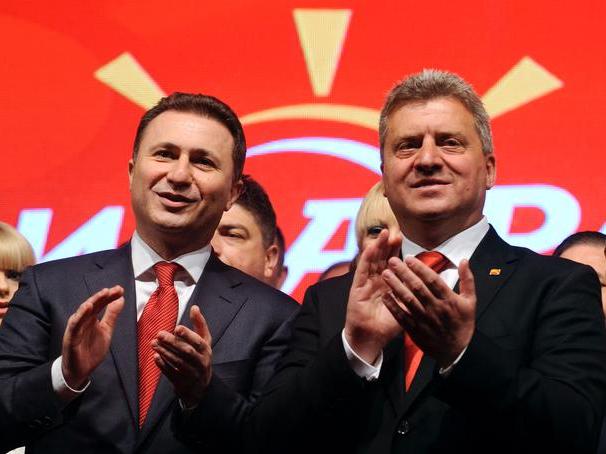
Prime Minister Nikola Gruevski and President Gjorge Ivanov | Photo by: AP/Boris Grdanoski
Macedonia’s centre-right VMRO DPMNE comfortably won a fourth term in office and Ivanov secured the presidency for the second time, but the opposition Social Democrats, SDSM, claimed that the snap parliamentary polls and second-round presidential elections were fraudulent, setting the scene for fresh political discord in the country.
The State Electoral Commission said that after almost 100 per cent of ballots were counted, VMRO DPMNE won over 480,000 votes and SDSM won 284,000 – the widest margin in favour of Prime Minister Nikola Gruevski’s party since it first came to power in 2006.
But although the ruling party insisted the vote was democratic, the Social Democrats alleged serious violations immediately after polls closed on Sunday evening.
“Macedonian citizens have been duped and the elections have been stolen. The government dared to conduct unfair, non-democratic and uncivilized elections,” SDSM leader Zoran Zaev told a press conference.
Zaev alleged “massive and public buying of votes in the presence and with the assistance of the police”. He said his party wanted a caretaker government to be formed and new presidential and parliamentary elections called.
The ruling party however dismissed reports by local election observers who documented various irregularities as a scenario concocted by the opposition as an ‘alibi’ for their poor results.
“I regret that SDSM has decided to negate the will of the people and work directly against the interests of the country and to benefit those that do not wish this country well,” Gruevski said in his victory speech.
“I hope that they will sleep on it and decide to act in accordance with the interests of this country,” he added.
In the presidential election run-off, incumbent Ivanov won a second term with the support of 534,000 voters, while his SDSM opponent Stevo Pendarovski took 398,000 votes.
The turnout for the early general election was 64 per cent while that for the presidential vote was 54.33 per cent, according to the State Electoral Commission, SEC.
In the ethnic Albanian bloc, the junior partner in the outgoing government, the Democratic Union for Integration, DUI, won most votes as expected and is likely to remain in coalition with VMRO. DUI won some 153,000 votes, trouncing its main rival, the Democratic Party of Albanians, DPA, which won just over 66,000 votes.
Albanians make up a quarter of Macedonia’s population and it has become an unwritten rule that the winner in this bloc is offered a place in the government.
Contradicting the SDSM’s claims, the SEC and the police said that Sunday’s voting passed off in a calm and democratic atmosphere with only minor irregularities reported.
“We have not received reports of any incidents. There are few occasions in which voters complained they were not in the electoral rolls but this is not a massive thing. We have no data about possible family voting, and political propaganda at polling stations may have happened in few places,” said Subhi Jakupi, the vice-president of the SEC.
Gruevski also praised the conduct of the polls.
“So far the elections are ongoing in a peaceful and democratic atmosphere and I hope that it will be like that until the end of the day and that Macedonia will win in these elections,” he told reporters after casting his ballot in Skopje.
But domestic observers from local NGOs MOST and CIVIL said they had registered cases of group and family voting in towns and villages across the country, as well as political propaganda at polling stations and voting by minors.
Among the allegations of suspected violations reported by local observers, monitors from CIVIL said they spotted several cases in which people were brought to polling stations by vans and buses. It said that a number of voters from Pustec in Albania who voted in advance as members of the diaspora had also cast extra ballots on polling day.
CIVIL also said it had seen members of the ruling party and former MPs making public calls to Roma citizens to vote for VMRO DPMNE, and had registered yet more cases of problems with the electoral roll in which people who came to vote were not on the list.
The SDSM accused the ruling party of being responsible for the violations.
“We have photos and videos that people are paid to vote for VMRO-DPMNE, they are pressurising voters, [conducting] family voting, [applying] pressures on the administration and users of social benefits,” Marinela Tuseva of the SDSM told a press conference.
According to the results published so far by the SEC, the ruling party will have 61 legislators in the 123-seat parliament. The coalition it led in the outgoing legislature had 53 MPs.
The opposition led by SDSM is now set to have 34 MPs, fewer than after the 2011 early general election when it won 42 parliamentary seats.
The DUI will have 19 legislators and the DPA seven. The newly-formed Citizen’s Option for Macedonia, GROM, and the National Democratic Party, NDP, will have one MP each.
International observers from the OSCE/ODIHR election monitoring mission will deliver their preliminary assessment of the elections later on Monday./balkaninsight/